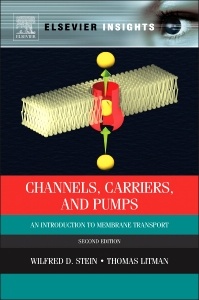Channels, Carriers, and Pumps (2nd Ed.) An Introduction to Membrane Transport
Auteurs : Stein Wilfred D., Litman Thomas

An introduction to the principles of membrane transport: How molecules and ions move across the cell membrane by simple diffusion and by making use of specialized membrane components (channels, carriers, and pumps). The text emphasizes the quantitative aspects of such movement and its interpretation in terms of transport kinetics. Molecular studies of channels, carriers, and pumps are described in detail as well as structural principles and the fundamental similarities between the various transporters and their evolutionary interrelationships. The regulation of transporters and their role in health and disease are also considered.
ChaptersStructural Basis of Movement Across Cell MembranesSimple Diffusion of Nonelectrolytes and IonsIon Channels Across Cell MembranesCarrier-Mediated Transport: Facilitated DiffusionCoupling of Flows of Substrates: Antiporters and SymportersPrimary Active Transport SystemsThe Regulation and Integration of Transport SystemsAppendicesSingle and Triple-Letter Codes for the Amino AcidsFundamental Constants, Conversion Factors, and Some Useful ApproximationsThe Relation between the Permeability Coefficient Ps and the Half-Time t1/2 of Entry of a Permeant
Thomas Litman works as a senior research scientist at LEO Pharma, where he is responsible for implementing bioinformatics in translational research. He has taught biophysics and transport physiology at the University of Copenhagen since 1994 and is the author of some 70 papers, most of which focus on multidrug resistance and functional characterization of drug transporters, such as P-glycoprotein. In particular the papers on transport kinetics of anticancer drugs, written together with his mentor, Professor Wilfred Stein, have been recognized as exemplary in the field. He completed his post-doctoral work at The National Cancer Institute, NIH 1997-9, where he played a key role in the identification and characterization of a new transporter, ABCG2 (MXR), involved in multidrug resistance. In 2002 he was appointed as Weimann associate research professor, and 2003-6 he was responsible for the master’s program in medical bioinformatics at the Bioinformatics Centre, University of Copenhagen. His interests range from basic and translational research to information technology and applied bioinformatics, including confocal mic
- Provides an introduction to the properties of transport proteins: channels, carriers, and pumps
- Presents up-to-date information on the structure of transport proteins and on their function and regulation
- Includes introductions to transport kinetics and to the cloning of genes that code transport proteins
- Furnishes a link between the experimental basis of the subject and theoretical model building
Date de parution : 12-2014
Ouvrage de 422 p.
15x22.8 cm
Thèmes de Channels, Carriers, and Pumps :
Mots-clés :
ABC transporters; Acetylcholine receptor; Action potential; Antiport; Bacteriorhodopsin; Calcium ATPase; Calcium channels; Caveolae; Cell migration; Chloride channels; Clathrin; Conductance; Cotransport; Diffusion; Diffusion potential; Donnan distribution; Epithelia; Equilibrium exchange; F0F1 ATPase; Facilitated diffusion; Fluid amphiphilic phase; GLUT1; GLUT4; Gap junction; Gating; Gramicidin; Infinite trans; Intrinsic proteins; Lipid rafts; Liposomes; Membrane potential; Membrane pumps; Membrane structure; OCTs; Osmosis; P-glycoprotein; Partition coefficients; Patch-clamping; Permeability; Polarized cells; Potassium channels; Primary active transport; Proton/drug exchangers; Proton/sugar symport; Regulatory volume decrease (RVD) and regulatory volume increase (RVI); Rotary ATPases; Sodium channels; Sodium/potassium ATPase; Sodium/proton exchange; Sodium/sugar symport; Symport; Transport kinetics; Water channels; Water cotransport; Zero trans



